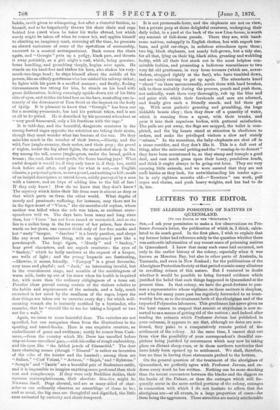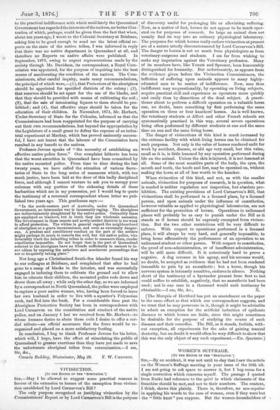LETTERS TO THE EDITOR.
THE ALLEGED POISONING OF NATIVES IN QUERNSLAND.
[TO THE EDITOR OF TRH SPECTATOR.1
SIE, —I ask your permission to make a few observations on Pro- fessor Jevons's letter, the publication of which is, I think, eaten- lated to do much good. In the first place, I wish to explain that my former letter had reference solely to the question whether there was authentic information of any recent cases of poisoning natives in Queensland. I knew that mazy such cases had occurred, not 'only in the earlier history of the colony, especially when it was known as Moreton Bay, but also in other parts of Australia, in Tasmania, and even in New Zealand ; for the publications of the Aborigines ProtectionSoeiety at that period contain many allusions to revolting crimes of this nature. But I ventured to doubt whether it would be possible to bring forward evidence which justified the belief that such things happened in Queensland at the present time. In that colony, we have the good-fortune to pos- sess a representative whose vigilance on these matters. is sleepless, and who for many years past has regularly forwarded to us trust- worthy facts, as to the treatment both of the aborigines and of the imported Polynesian labourers. This gentleman has never given us the least reason to suspect that arsenic or strychnine is now re- sorted to as a means of getting rid of the natives ; and indeed after reading the extracts which Professor Jevons has published. in your columns, it appears to me that, although no dates are men- tioned, they point to a comparatively remote period of the settlement of the colony. At the same time, I cannot shut out from view the possibility of your correspondent's dreadful sus- picions being justified by occurrences which may now be taking place on distant sheep-runs, or in those northern territories that have lately been opened up to settlement. We shall, therefore, lose no time in having these statements probed to the bottom.
On the general question of the treatment of the aborigines of Queensland, we perfectly agree with Professor Jevons, and en- dorse every word he has written. Nothing can be more shocking than the recent encounters between the blacks and the diggers on the banks of the Palmer, or than the outrages which still fre- quently occur in the more settled portions of the colony, outrages in connection with which I do not hesitate to affirm that the aborigines are—at all events, in a large proportion of cases—far from being the aggressors. These atrocities are mainly attrihutable to the practical indifference with which until lately the Queensland Government has regarded the interests of the natives, no better iilus - tration of which, perhaps, could be given than the fact that when, about ten years ago, I wrote to the Colonial Secretary at Brisbane, asking him to be good enough to send me the latest official re- ports on the state of the native tribes, I was informed in reply that there was no native department in Queensland at all, and therefore no Reports on native affairs were published. In September, 1873, owing to urgent representations made by the society through Mr. Davidson, its correspondent, a Royal Com- mission was appointed, for the purpose of inquiring into the best means of ameliorating the condition of the natives. The Com- missioners, after careful inquiry, made many recommendations, the principal of which were,—(1), that Protectors of the aborigines should be appointed for specified districts of the colony; (2), that reserves should be set apart for the use of the blacks, and that they should be provided with means of cultivating the soil ; (3), that the sale of intoxicating liquors to them should be pro- hibited; and (4), that effective steps should be taken for the education of their children. In November, 1874, Mr. Herbert, Under-Secretary of State for the Colonies, informed us that the Commissioners had been reappointed for the purpose of carrying out their own recommendations, but beyond the appropriation by the Legislature of a small grant to defray the expense of an indus- trial experiment at Mackay, which has proved eminently success- ful, I have not learnt that the labours of the Commission have resulted in any benefit to the natives.
Professor Jevons speaks of "the necessity of establishing an effective native police force." Our complaint hitherto has been that the worst atrocities in Queensland have been committed by the native mounted police. From time to time during the last twenty years, we have called the attention of various Secre- taries of State to the long series of massacres which, with too much justice, have been laid at the door of this badly disciplined force, and although I cannot venture to ask you to occupy your columns with any portion of the sickening details of these barbarities which are in my possession, yet I would beg to quote the testimony of a reverend correspondent whose letter we pub- lished two years ago. This gentleman says :—
" In the north-eastern part of Australia, undor the Queensland Government, an internecine war is incessantly raging. The aborigines are indiscriminately slaughtered by the native police. Ostensibly these are employed as trackers, but in truth they are wholesale assassins. The Government in these remote and newly-settled districts is too weak to afford protection. The whites in general regard the neighbourhood of aborigines as a grave,inconvenience, and even as extremely danger- ous. A prudent and conciliatory conduct on the part of the settlers might perhaps do mach to remove the evil, but the native police, who invariably track the defaulting tribes in order to massacre them, render conciliation impossible. Do not forget that in the part of Queensland referred to the aborigines have no friends sufficiently in earnest to in- cur odium by exposing the nefarious and murderous proceedings that are so frequently taking place."
Not long ago a Christianised South-Sea islander found his way to our colleague at Brisbane, and complained that after he had gone to a camp of blacks in the interior, and was successfully engaged in inducing them to cultivate the ground and to allow him to educate their children, the mounted police rode down and
drove them all away ; while only the other day, as we are informed by a correspondent in North Queensland, the police were employed
to capture a poor native Woman, who, having been forced to leave her own husband in order to live with a squatter's Polynesian cook, had fled into the bush. For a considerable time past the Aborigines Protection Society has been in correspondence with Lord Carnarvon on the constitution and conduct of the native police, and on January 4 last we received from Mr. Herbert—to whose humane desire to abate these evils I desire to offer a cor- dial tribute—an official assurance that the force would be re- organised and placed on a more satisfactory footing.
In conclusion, I beg to thank Professor Jevons for his letter, which will, I hope, have the effect of stimulating the public of Queensland to greater exertions than they have yet made to save the unfortunate aboriginal tribes from extermination.—I am, Sir, &c.,
Canada Building, Westminster, May 29. F. W. CHESSON.































 Previous page
Previous page